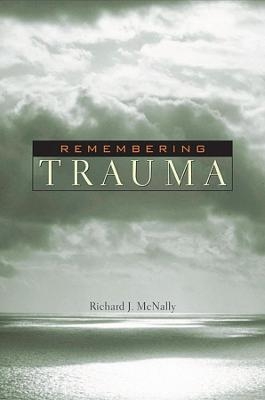
Remembering Trauma
Seiten
2005
The Belknap Press (Verlag)
978-0-674-01802-0 (ISBN)
The Belknap Press (Verlag)
978-0-674-01802-0 (ISBN)
This book, by a clinician who is also a laboratory researcher, is the first comprehensive, balanced analysis of the clinical and scientific evidence bearing on memory and trauma—and the first to provide definitive answers to the urgent questions at the heart of the controversy.
Are horrific experiences indelibly fixed in a victim’s memory? Or does the mind protect itself by banishing traumatic memories from consciousness? How victims remember trauma is the most controversial issue in psychology today, spilling out of consulting rooms and laboratories to capture headlines, rupture families, provoke legislative change, and influence criminal trials and civil suits. This book, by a clinician who is also a laboratory researcher, is the first comprehensive, balanced analysis of the clinical and scientific evidence bearing on this issue—and the first to provide definitive answers to the urgent questions at the heart of the controversy.
Synthesizing clinical case reports and the vast research literature on the effects of stress, suggestion, and trauma on memory, Richard McNally arrives at significant conclusions, first and foremost that traumatic experiences are indeed unforgettable. Though people sometimes do not think about disturbing experiences for long periods of time, traumatic events rarely slip from awareness for very long; furthermore, McNally reminds us, failure to think about traumas—such as early sexual abuse—must not be confused with amnesia or an inability to remember them. In fact, the evidence for repressed memories of trauma—or even for repression at all—is surprisingly weak.
A magisterial work of scholarship, panoramic in scope and nonpartisan throughout, this unfailingly lucid work will prove indispensable to anyone seeking to understand how people remember trauma.
Are horrific experiences indelibly fixed in a victim’s memory? Or does the mind protect itself by banishing traumatic memories from consciousness? How victims remember trauma is the most controversial issue in psychology today, spilling out of consulting rooms and laboratories to capture headlines, rupture families, provoke legislative change, and influence criminal trials and civil suits. This book, by a clinician who is also a laboratory researcher, is the first comprehensive, balanced analysis of the clinical and scientific evidence bearing on this issue—and the first to provide definitive answers to the urgent questions at the heart of the controversy.
Synthesizing clinical case reports and the vast research literature on the effects of stress, suggestion, and trauma on memory, Richard McNally arrives at significant conclusions, first and foremost that traumatic experiences are indeed unforgettable. Though people sometimes do not think about disturbing experiences for long periods of time, traumatic events rarely slip from awareness for very long; furthermore, McNally reminds us, failure to think about traumas—such as early sexual abuse—must not be confused with amnesia or an inability to remember them. In fact, the evidence for repressed memories of trauma—or even for repression at all—is surprisingly weak.
A magisterial work of scholarship, panoramic in scope and nonpartisan throughout, this unfailingly lucid work will prove indispensable to anyone seeking to understand how people remember trauma.
Richard J. McNally is Professor of Psychology and Director of Clinical Training at Harvard University.
1. The Politics of Trauma 2. How We Remember 3. What Is Psychological Trauma? 4. Memory for Trauma 5. Mechanisms of Traumatic Memory 6. Theories of Repression and Dissociation 7. Traumatic Amnesia 8. False Memories of Trauma 9. A View from the Laboratory 10. Controversies on the Horizon Notes Works Cited Acknowledgments Index
| Erscheint lt. Verlag | 26.6.2005 |
|---|---|
| Verlagsort | Cambridge, Mass. |
| Sprache | englisch |
| Maße | 156 x 235 mm |
| Gewicht | 662 g |
| Themenwelt | Geisteswissenschaften ► Psychologie ► Allgemeine Psychologie |
| Geisteswissenschaften ► Psychologie ► Biopsychologie / Neurowissenschaften | |
| Medizin / Pharmazie ► Medizinische Fachgebiete ► Notfallmedizin | |
| ISBN-10 | 0-674-01802-8 / 0674018028 |
| ISBN-13 | 978-0-674-01802-0 / 9780674018020 |
| Zustand | Neuware |
| Informationen gemäß Produktsicherheitsverordnung (GPSR) | |
| Haben Sie eine Frage zum Produkt? |
Mehr entdecken
aus dem Bereich
aus dem Bereich
Techniken der Verhaltenstherapie
Buch (2024)
Julius Beltz GmbH & Co. KG (Verlag)
CHF 48,95


